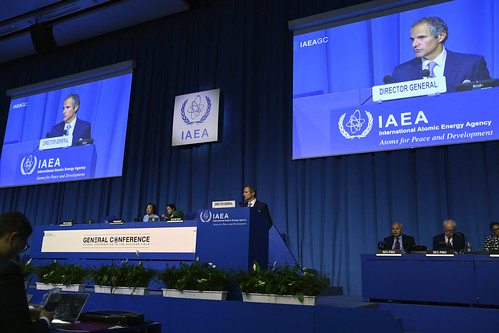 IAEA Director General Rafael Mariano Grossi, who has been reappointed for a second four-year term as Director General beginning December 2023, in his opening address to the 67th General Conference, referred to US President Dwight D Eisenhower’s ‘Atoms for Peace’ speech in 1953. He noted that his vision has become an important, active part of the IAEA’s contribution towards international peace and security and furthering sustainable development. “The IAEA is the operational instrument of this noble cause,” Grossi said.
IAEA Director General Rafael Mariano Grossi, who has been reappointed for a second four-year term as Director General beginning December 2023, in his opening address to the 67th General Conference, referred to US President Dwight D Eisenhower’s ‘Atoms for Peace’ speech in 1953. He noted that his vision has become an important, active part of the IAEA’s contribution towards international peace and security and furthering sustainable development. “The IAEA is the operational instrument of this noble cause,” Grossi said.
He stressed the role of nuclear power to mitigate climate change and how more countries are expressing interest in nuclear energy, particularly through new avenues, such as small modular reactors (SMRs). “Nuclear energy is safer than it has ever been, and it is safer than almost any other source of energy,” he added, citing research that puts nuclear energy at about the level of wind and solar when measured in fatalities per unit of energy produced.
There are 410 nuclear power reactors operating in 31 countries totalling more than 368 000 MWe in installed capacity, he noted. This equates to 10% of the world’s total electricity and a quarter of its low carbon supply. “Further down the line, nuclear fusion promises the possibility of abundant energy,” he said. “Four years ago, IAEA activities on fusion were exclusively focused on science. Today, we have expanded our efforts, aiming also to accelerate development and deployment of fusion energy systems.”
Since Grossi became Director General in 2019, the number of States with safeguards agreements in force increased from 184 to 190 States; and those with Additional Protocols increased from 136 to 141. “I have been committed to strengthening the legal framework on which the continued verification of the peaceful use of nuclear material relies,” he said.
He noted that “maximising the IAEA talent pool and creating the conditions for gender equality are important priorities”. At the start of his tenure, 30% of the IAEA’s staff serving in the professional or higher category were women. He set a goal for gender parity by 2025 and put in place policies to achieve that goal. As of August 2023, the overall representation of women has reached 43%.
Grossi concluded his remarks, expressing gratitude to Austria, the IAEA’s host country, “for doing everything possible to enable our work.” He also thanked Monaco for hosting the IAEA Marine Environment Laboratories. Seventy years after Eisenhower’s speech, “the dream of Atoms for Peace, now Atoms for Peace and Development, lives on,” he said. “Making it a reality is up to all of us.”
The week-long General Conference is the largest annual meeting of the Agency’s 177 member states. Many countries are represented at the ministerial level, and more than 2800 people registered to attend the Conference throughout the week. General Conference sessions in the Plenary Hall were livestreamed. Throughout the week, the IAEA and individual member states will host more than 100 side events, highlighting different aspects of nuclear science and technology and the IAEA's work. At the start of the plenary session on the first day, Vilawan Mangklatanakul of Thailand was elected by acclamation as President of the Conference.
The IAEA Scientific Forum is the flagship side event of the General Conference, and this year focused on nuclear innovations for net zero. The event saw leading experts from around the world highlighting the role of new nuclear reactors for energy production and exploring the importance of innovations. The two-day forum provided a platform of exchange for academics, policy makers and other experts to discuss the key role of nuclear energy as a reliable solution for mitigating climate change and transitioning to a net zero world. Addressing the Forum, Grossi highlighted that innovation is at the heart of many discussions to advance nuclear power and, ultimately, fighting climate change. The closing session featured a high-level panel that underlined key findings and conclusions to guide countries and the IAEA. Over two days and three comprehensive sessions, experts delved into topics ranging from new reactor designs to advanced supporting technologies, like artificial intelligence, robotics and digitalisation.
Image: Director General Rafael Mariano Grossi speaking at the IAEA General Conference in Vienna (courtesy of IAEA)






